Showing top 0 results 0 results found
Showing top 0 results 0 results found

Are you tired of unpredictable cash flow and constant client churn? It’s frustrating when every month feels like a race to secure new clients just to keep the business afloat.
But what if you could secure a [steady income stream], allowing you to focus more on growth and less on scrambling for the next project?
Recurring revenue is the solution. Unlike one-off projects, where income is sporadic, recurring revenue ensures a reliable cash flow by providing consistent, repeat business.
Whether through subscriptions, retainers, or automated services, recurring revenue offers stability, scalability, and predictability—three critical elements that allow your agency to thrive.
Let's explore unique and actionable recurring revenue models that can transform your agency’s business structure. From service-based models to innovative affiliate programs, we’ll cover practical strategies to help you start your path to long-term, sustainable growth.
👉 Read 35 Best Reseller Programs You Can Join Today
Why is recurring revenue a must for digital agencies?
In today’s competitive market, generating recurring revenue is more than a financial strategy. It’s a fundamental shift that can transform your agency's stability and growth potential. Here's why it's essential for your agency:
- Consistent cash flow: Recurring revenue provides predictable, steady monthly income, allowing for better cash flow management. With less reliance on one-off projects, agencies can plan and budget more effectively.
- Higher customer lifetime value (CLV): Ongoing relationships with clients lead to higher CLV as they invest in long-term services. It also fosters loyalty, reducing churn and increasing overall revenue per client.
- Scalability with lower risk: Agencies can scale their operations by expanding recurring service offerings with fewer risks. Also, a predictable revenue stream makes forecasting growth and managing resources easier.
- Improved operational efficiency: Streamlined processes for delivering repeatable services, like SEO or content management, increase efficiency. Automating service delivery and client management reduces manual effort and costs.
- Enhanced business valuation: Agencies with recurring revenue models attract investors or potential buyers more. The predictable income stream makes the business more stable, raising its overall market value.
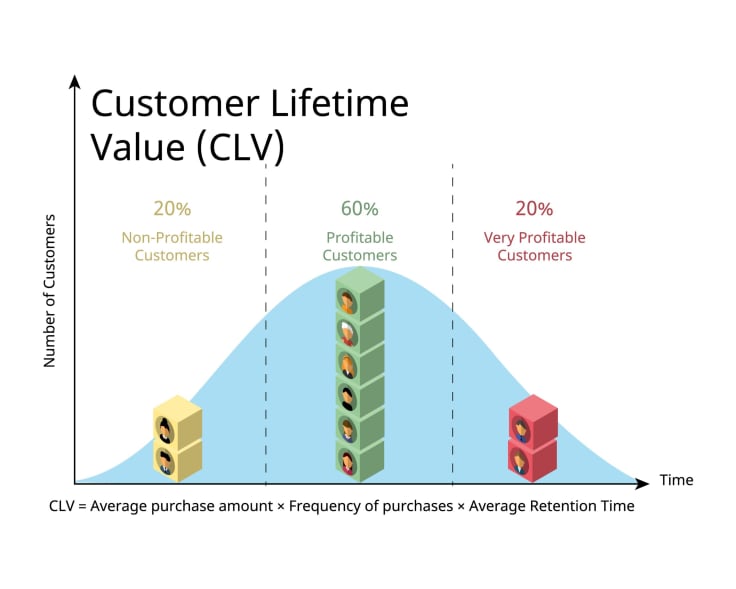
Recurring revenue ideas for digital agencies
Recurring revenue strategy can help you build lasting relationships and scale smarter. By embracing innovative models, your digital agency can secure a consistent income stream while delivering ongoing value to clients. Start exploring these ideas today and transform your agency into a growth powerhouse.
1. Service-based recurring revenue models
Service-based models are an excellent way for digital agencies to ensure steady cash flow while addressing clients' ongoing needs. Let's explore some proven models to maintain stronger client relationships, stabilize income, and scale operations efficiently.
a. Retainer agreements:
A retainer agreement is one of the most reliable ways for agencies to secure a steady income. With this model, clients pay a fixed monthly fee in exchange for a set of services, such as:
- SEO (search engine optimization): Ongoing keyword research, on-page optimization, and backlink building.
- Content marketing: Regular creation and distribution of blogs, videos, or infographics.
- PPC management: Continuous ad monitoring, A/B testing, and budget optimization.
Marketing strategies like SEO and PPC require regular adjustments to stay effective. A retainer ensures the client’s campaigns evolve with market trends, improving results. Agencies can benefit from guaranteed income, allowing them to allocate resources effectively.
b. Website maintenance plans
Every website requires periodic attention, and clients often prefer outsourcing these tasks to experts. Website maintenance is a recurring need for most businesses, making it a perfect candidate for a service-based revenue model.
A well-maintained website ensures consistent functionality, reinforcing the client’s dependence on your services. Agencies can offer plans that include:
- Regular backups: Prevent data loss and ensure quick recovery in case of errors.
- Software updates: Keep content management systems, plugins, and themes secure and up to date.
- Performance monitoring: Track loading times and fix issues to maintain an optimal user experience.
- Web hosting: Bundle maintenance with hosting for added convenience.
Maintenance clients are more likely to seek additional services like redesigns or marketing support. Provide monthly reports detailing updates and performance metrics to demonstrate value and keep clients engaged.
c. Social media management
Social media is a dynamic space that demands constant attention. Many businesses recognize the importance of social media but lack the time or expertise to manage it effectively.
Agencies offering social media management packages can help clients stay active and relevant with:
- Content creation: Regular posts, including text, visuals, and videos tailored to the brand’s voice.
- Scheduling and posting: Consistent publication of content across platforms.
- Analytics reporting: Monthly insights into engagement, reach, and ROI.
By providing measurable results (e.g., increased followers or higher engagement), agencies can easily justify ongoing fees. Also, agency owners can provide custom solutions that target specific platforms or industries.
Pro Tip: Include platform-specific strategies in your packages. For instance, Instagram content may focus on visually engaging posts, while LinkedIn content targets B2B audiences with thought leadership pieces.
Looking for a new revenue stream? Join forces with us!
Offer top-notch communication products to your clients and be supported all the way.
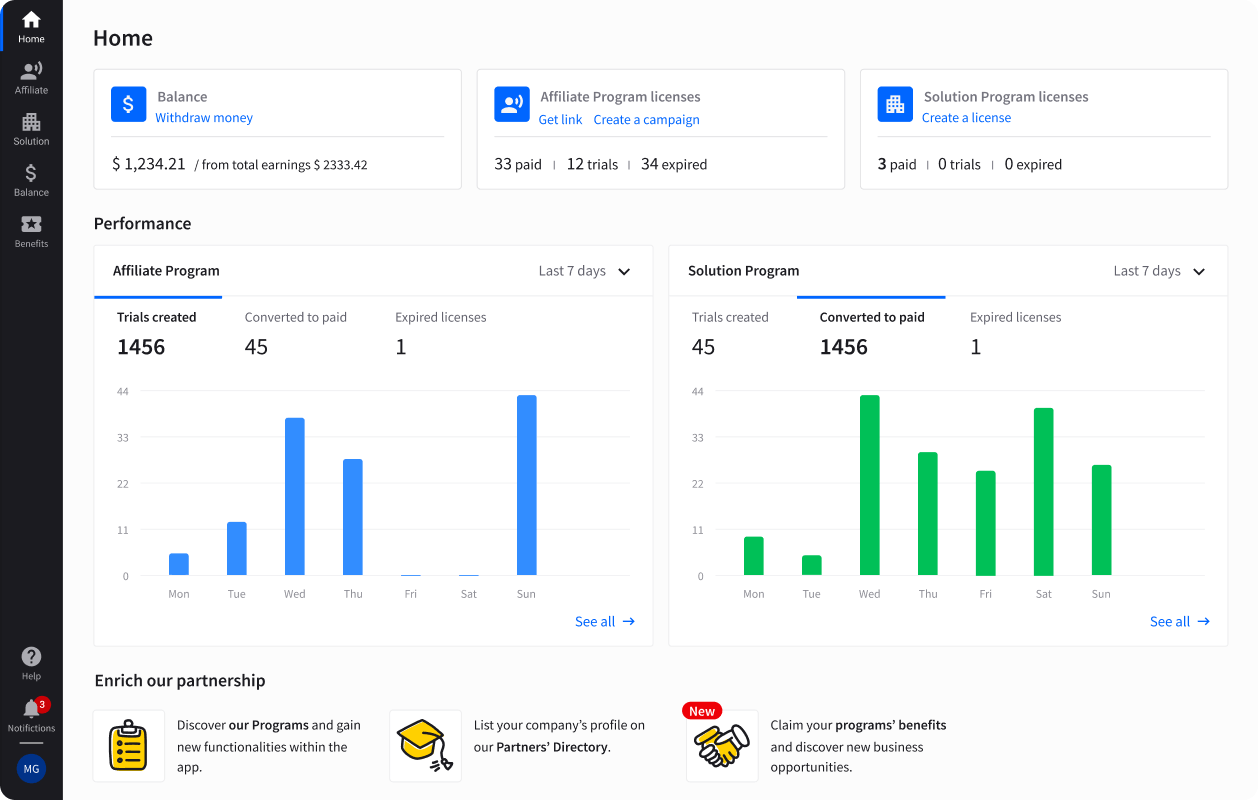
2. Partnership revenue streams
For digital agencies, recurring revenue streams can help you achieve long-term stability. Partner and affiliate programs can help you generate recurring income while expanding your service offerings. The two most effective methods include:
a. Referral programs
Referral programs allow agencies to partner with SaaS platforms and earn a percentage of revenue from subscriptions generated through their referrals. These programs are ideal for agencies looking to recommend tools their clients already need without the responsibility of managing the product.
You can choose programs that align with your client base. For example, an agency serving small businesses might recommend CRM or marketing automation platforms tailored to this audience.
If you’re an established agency with an engaged audience, the Text Partner Program is your golden ticket to lucrative passive income. With powerful SaaS tools like ChatBot, HelpDesk, and LiveChat, you promote solutions that businesses already love.
It's worth joining because of:
- Big earnings: Earn up to 22% commission per sale; top affiliates have made over $4M!
- Generous cookie window: A 120-day duration means more chances to earn from your referrals.
- Tools to succeed: Get banners, videos, and a custom link builder with perks like extra discounts and longer trials.
- Smart campaign tracking: Manage performance and maximize earnings with a user-friendly Partner App.
You simply need to:
- Sign up: Quick and easy approval process.
- Promote: Use affiliate links and pro-level assets to drive conversions.
- Track: Monitor campaigns and fine-tune strategies with the Partner App.
- Earn: Reap the rewards of one of the highest-paying SaaS affiliate programs.
b. Managed SaaS reselling
For agencies with technical expertise, managed SaaS reselling goes further by allowing you to resell popular tools directly to clients. Beyond earning revenue from the sale, you can charge for onboarding, training, and ongoing support. You need to:
- Partner with SaaS providers offering reseller programs.
- Purchase licenses at wholesale rates and resell them to clients at a markup.
- Bundle the software with services like setup, customization, and training to create a comprehensive package.
Example:
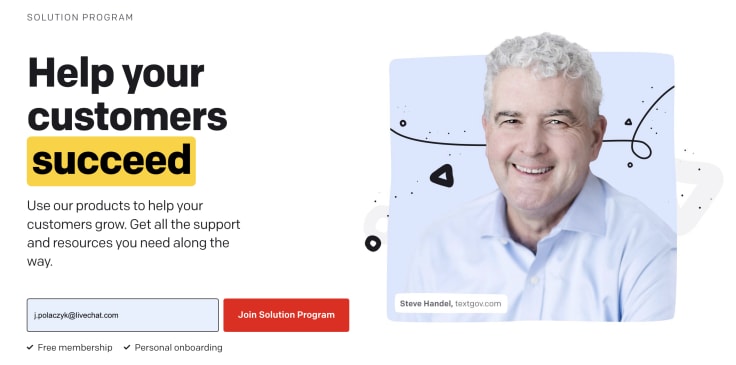
By joining our Partner Program you can deliver exceptional communication tools to your clients and get 24/7 support. Here's more about the membership in the program.
Earnings potential:
- Resell our products (you get a 20% discount when purchasing our products, and you can set your own price for your customers).
- Refer our products to your customers (they’ll pay the full product price, and you’ll be rewarded with a 20% commission).
- Submit leads (you refer a lead, you're excluded from the sales process, and you get $500).
Benefits:
- Comprehensive support and resources (like personal onboarding, demo accounts, and sales materials)
- Progress through Bronze, Silver, and Gold tiers to unlock additional perks like co-marketing opportunities, increased visibility on the LiveChat Marketplace, and priority support.
- Leverage all products to create tailored communication solutions for your clients, adding a competitive advantage and new revenue stream to your business.
3. Subscription-based digital products
Agencies can tap into passive income opportunities and expand their client base beyond traditional service boundaries through subscription-based products and creating products that deliver consistent value.
a. Custom SaaS tools
Custom SaaS (Software as a Service) tools are cloud-based applications designed to solve specific problems for businesses or industries. Agencies can build these tools and offer them as white-labeled solutions, allowing clients to use them under their branding.
For example, a real estate-focused agency might offer:
- Lead management software: Help realtors track and nurture prospects.
- Social media automation: Schedule and analyze posts for real estate listings.
- Analytics dashboards: Provide insights into marketing performance tailored to real estate metrics.
To get started:
- Identify common pain points in your target niche that could be solved with automation or streamlined processes.
- Partner with a software developer if your agency lacks technical expertise.
- Offer tiered subscriptions with options for additional features or integrations.
Now, let me mention that if you're looking for SaaS tools helping to boost customer service at scale, you can take a look at our LiveChat, ChatBot, or HelpDesk.
They help to support website visitors and make more sales with the great help of AI. With faster resolutions and more customers served using AI chatbots, our products take the heat off your support agents, allowing them to devote more time to solving complex customer issues.
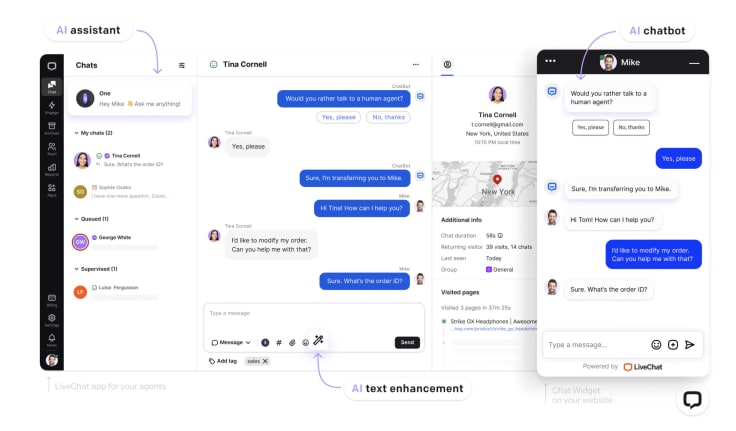
👉 Check how Auto Accessories Garage Website Got 485% Conversion Boost with LiveChat
b. Educational portals
Educational portals are subscription-based membership sites that offer exclusive access to training, templates, and resources. These portals cater to businesses or individuals looking to upskill or streamline their operations.
Some key features to include:
- Video training: Step-by-step tutorials on relevant topics like digital marketing, analytics, or design.
- Downloadable templates: Ready-to-use resources such as proposal templates, marketing calendars, or budgeting sheets.
- Community access: Private forums or groups where members can network, share insights, and ask questions.
They are effective because of:
- High perceived value: Subscribers see tangible benefits from access to premium content.
- Scalable income: Once created, educational materials can be sold repeatedly with little additional effort.
- Authority building: A well-designed portal positions the agency as an industry leader, attracting more clients.
Example: A digital marketing agency could create a portal for small business owners, teaching them how to manage their online presence effectively while providing templates for tasks like ad copywriting or keyword research.
4. Unique and emerging ideas
As the digital landscape evolves, marketing agencies must explore innovative ways to create recurring revenue. Unique and emerging models mentioned below cater to modern client needs and position your agency as a cutting-edge solution provider.
a. Digital asset management plans
Many businesses struggle to organize and maintain digital assets like logos, marketing videos, brand guidelines, and product imagery. Agencies can enter by offering asset management plans as a subscription service. You can offer:
- Secure storage: Provide cloud-based storage solutions with easy access to assets.
- Organization: Tag, categorize, and archive assets for quick retrieval.
- Updates and maintenance: Manage updates for assets like logo redesigns or revised marketing materials.
It works because of:
- Ongoing value: Clients constantly need access to updated, well-organized assets.
- High retention rates: Once clients rely on your system, they are less likely to switch providers.
- Cross-selling opportunities: Offer complementary services like branding consultations or new asset creation.
Example: An agency provides a $500/month plan to manage all marketing assets for a retail brand, ensuring seamless use across campaigns and channels.
You can also integrate these systems with tools like content management or design platforms for added convenience.
b. AI-driven services
Artificial intelligence is transforming industries, and agencies can capitalize on this trend by offering AI-driven recurring services. You can offer:
- Chatbot setups: Design, deploy, and maintain AI chatbots for customer support or lead generation.
- Personalized marketing automation: Use AI tools to analyze user behavior and deliver tailored content and marketing services, such as product recommendations or email campaigns.
- Predictive analytics: Provide insights that help clients anticipate trends and make data-driven decisions.
The benefits are not limited to:
- Cutting-edge appeal: AI solutions are in high demand, especially among tech-savvy clients.
- Recurring updates: AI models require regular training and fine-tuning to create a recurring revenue model.
- Scalable solutions: AI tools often benefit multiple clients with minimal incremental effort.
Example: An agency offers a $1,000/month plan to manage an AI chatbot for a SaaS company, including updates and analytics reporting. For added value, you can also bundle AI services with existing offerings, such as CRM integration or social media automation.
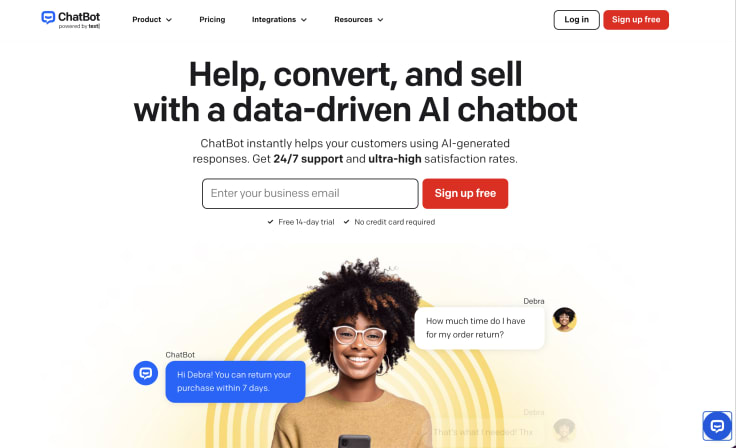
c. White-labeled marketing systems
White-label marketing systems let clients purchase ready-to-use solutions that they can rebrand as their own. These systems appeal to businesses looking for turnkey solutions without the development hassle. You can add:
- Email marketing systems: Templates, automation workflows, and analytics dashboards.
- Social media schedulers: Tools with pre-built post templates and tracking features.
- Lead generation funnels: Complete systems that guide prospects from awareness to conversion.
The recurring revenue business model is great for agencies because of:
- High scalability: Develop one system and sell it to multiple clients with minor customization.
- Client stickiness: Switching costs are high once clients integrate your system into their operations.
- Recurring revenue: Charge monthly or annual licensing fees.
Example: An agency creates a white-labeled social media management tool for small businesses, charging $200/month per client. You can also offer training or onboarding as an additional revenue stream to help clients maximize the system’s potential.
d. Content subscription service
Content creation is at the heart of every digital marketing strategy but requires consistent effort and planning. By offering a content subscription service, agencies can provide clients regular deliveries of blog posts, videos, or email campaigns tailored to their industry.
You can try including:
- Blog posts: Regularly delivered, SEO-optimized articles that cater to the client’s audience and industry.
- Video content: Professionally produced videos for marketing campaigns, including explainer videos, product demos, or social media clips.
- Email campaigns: Ongoing, personalized email sequences designed to nurture leads and maintain client engagement.
It's in demand because businesses need fresh, relevant content regularly to stay competitive, ensuring a steady flow of subscribers. Also, once content templates and processes are set, delivering content to multiple clients becomes efficient.
Regular content boosts SEO performance and helps maintain audience interest, making it a valuable service for clients. You can segment content packages based on industry-specific needs (e.g., eCommerce-focused blog posts vs. professional services content) to appeal to diverse niches and gain monthly recurring revenue.
Building and scaling recurring revenue stream
Creating recurring revenue streams is only the first step. Scaling them effectively turns a good idea into a thriving business model. Digital agencies must focus on strategic planning, automation, and customer retention to ensure long-term success.
1. Start with market research
Before you can build successful recurring revenue streams, it’s essential to understand your target market deeply. Market research helps identify client pain points, preferences, and recurring needs.
To conduct market research:
- Survey existing clients: Ask about their most significant challenges and the services they’d use on an ongoing basis.
- Analyze competitors: Study how other agencies package and market their recurring services.
- Use online tools: Platforms like Google Trends, social media polls, or keyword research tools can highlight popular client concerns.
Focus on pain points that align with your agency’s strengths. For example, if clients struggle with consistent branding, develop a subscription service around asset management or content creation.
2. Package your services for recurrence
Once you’ve identified a recurring need, the next step is to package your services into compelling, affordable offers that clients find irresistible. To design the best packages:
- Bundle services: Combine related services, like SEO and content marketing, into a comprehensive monthly package.
- Tiered pricing: Offer basic, advanced, and premium plans to cater to different budgets and needs.
- Focus on value: Highlight the time or cost savings clients will gain from a recurring partnership.
Example: A digital marketing agency might create three tiers:
- Basic: Create and post monthly social media content.
- Advanced: Social media plus email marketing campaigns.
- Premium: Everything in advance, plus ad campaign management and analytics.
3. Automate service delivery
Manual processes can limit your ability to scale. Automating routine tasks reduces costs and ensures a seamless experience for your clients.
- Use CRM platforms to manage client subscriptions and automate renewals.
- Integrate payment processors for seamless billing.
- Automate repetitive tasks like email updates, analytics reports, or social media scheduling.
Automation frees up time to focus on strategy and client acquisition. Also, it reduces errors and ensures consistency in service delivery. You can enhance client satisfaction by providing faster responses and streamlined services. Start small by automating one aspect of your business, like billing, and gradually expand to other areas.
4. Focus on client success
Recurring revenue thrives on client retention. The longer your clients stay with your agency, the greater the lifetime value. Prioritizing customer success ensures they see measurable results, keeping them invested in your services. A satisfied client is more likely to renew their subscription and refer others.
To build long-term relationships:
- Regular check-ins: Schedule monthly calls or meetings to review progress and discuss goals.
- Data-driven results: Share detailed reports demonstrating your work's impact on their business.
- Proactive problem-solving: Anticipate issues and offer solutions before clients notice problems.
You can create a dedicated customer success team to nurture relationships, identify upsell opportunities, and handle renewals.
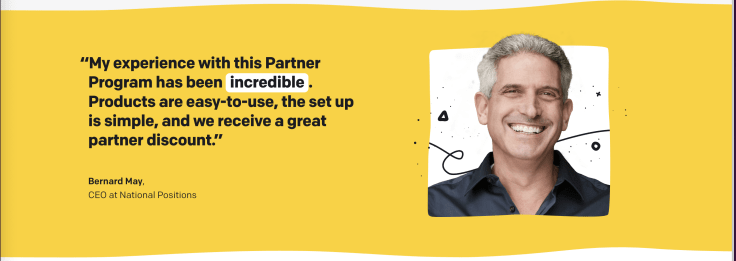
How can you pitch recurring revenue models to clients?
Pitching recurring revenue models to clients requires focusing on the value and benefits rather than the upfront costs. Start by framing recurring services as a cost-effective, long-term investment.
- Show value, not costs: Highlight how they save clients time, reduce effort, and deliver consistent results. For example, instead of emphasizing the monthly fee, show how ongoing SEO services can steadily improve search rankings, increasing organic traffic and conversions over time.
Use case studies or success stories to demonstrate predictable outcomes. Share examples of clients who achieved measurable results, such as a 30% increase in website traffic or improved customer engagement through consistent social media management. Data-driven insights build trust and help potential clients envision the tangible benefits of your recurring services.
- Tiered offerings: Consider offering tiered packages to cater to diverse needs and budgets. A basic plan might include essential services like website maintenance or analytics. At the same time, premium or enterprise-level subscriptions could offer advanced features such as personalized consulting, strategic planning, or comprehensive campaign management. Providing options empowers clients to choose a package that aligns with their goals and resources.
Also, ensure your pitch is client-centric, emphasizing how recurring models simplify their workload, provide ongoing support, and help them achieve sustainable growth. When clients see the predictable value your services bring, they’ll view recurring models as an indispensable part of their business strategy.
Conclusion
Recurring revenue is the cornerstone of stability, growth, and scalability for digital agencies. By embracing models prioritizing long-term relationships and predictable income, you can future-proof your business against market fluctuations and unlock new growth opportunities.
Start small, experiment with different models, and iterate based on client needs and feedback. The key is to remain adaptable and committed to delivering consistent value.
Embrace recurring revenue service now, and watch your agency grow into a powerhouse of consistent profits and lasting success!


